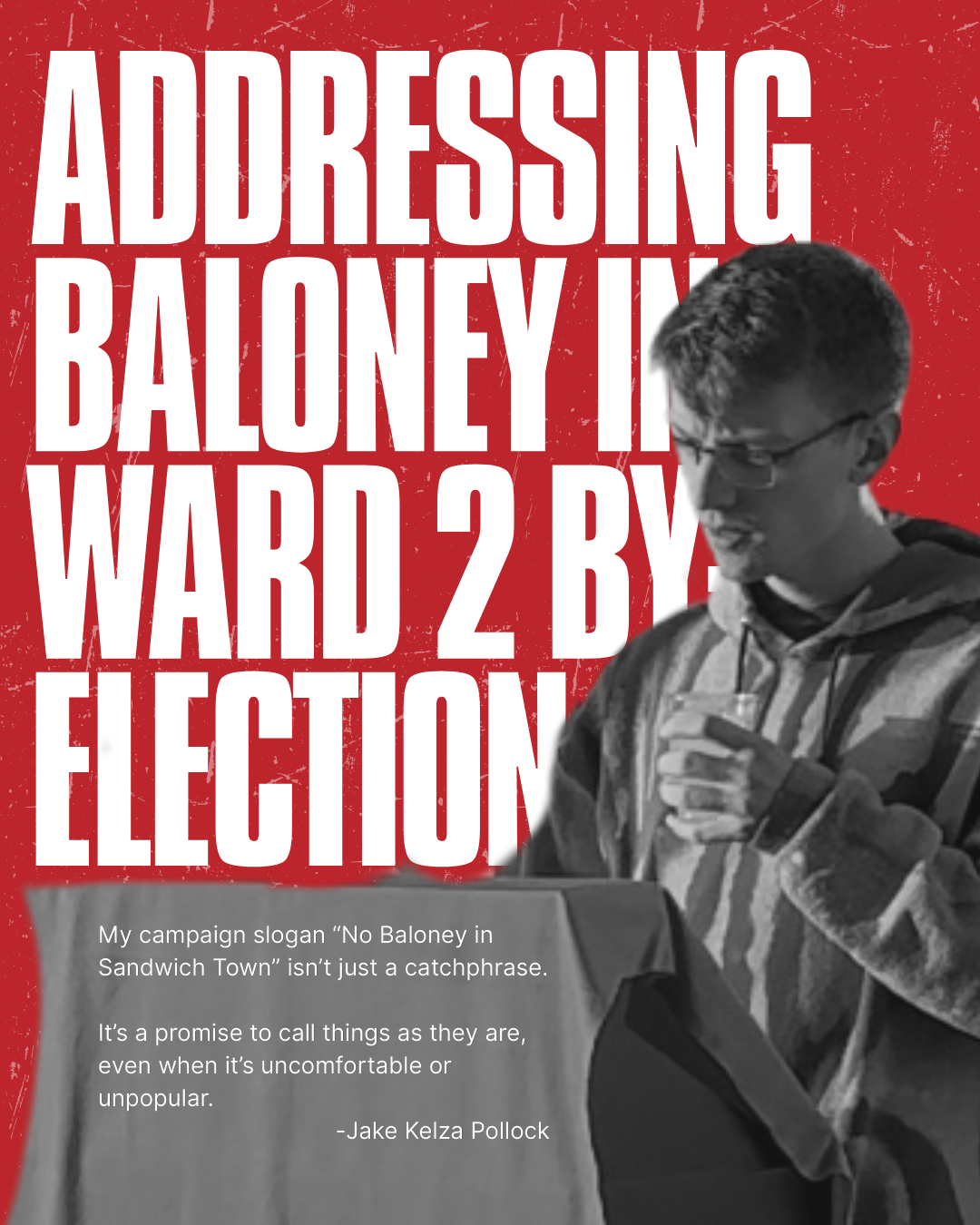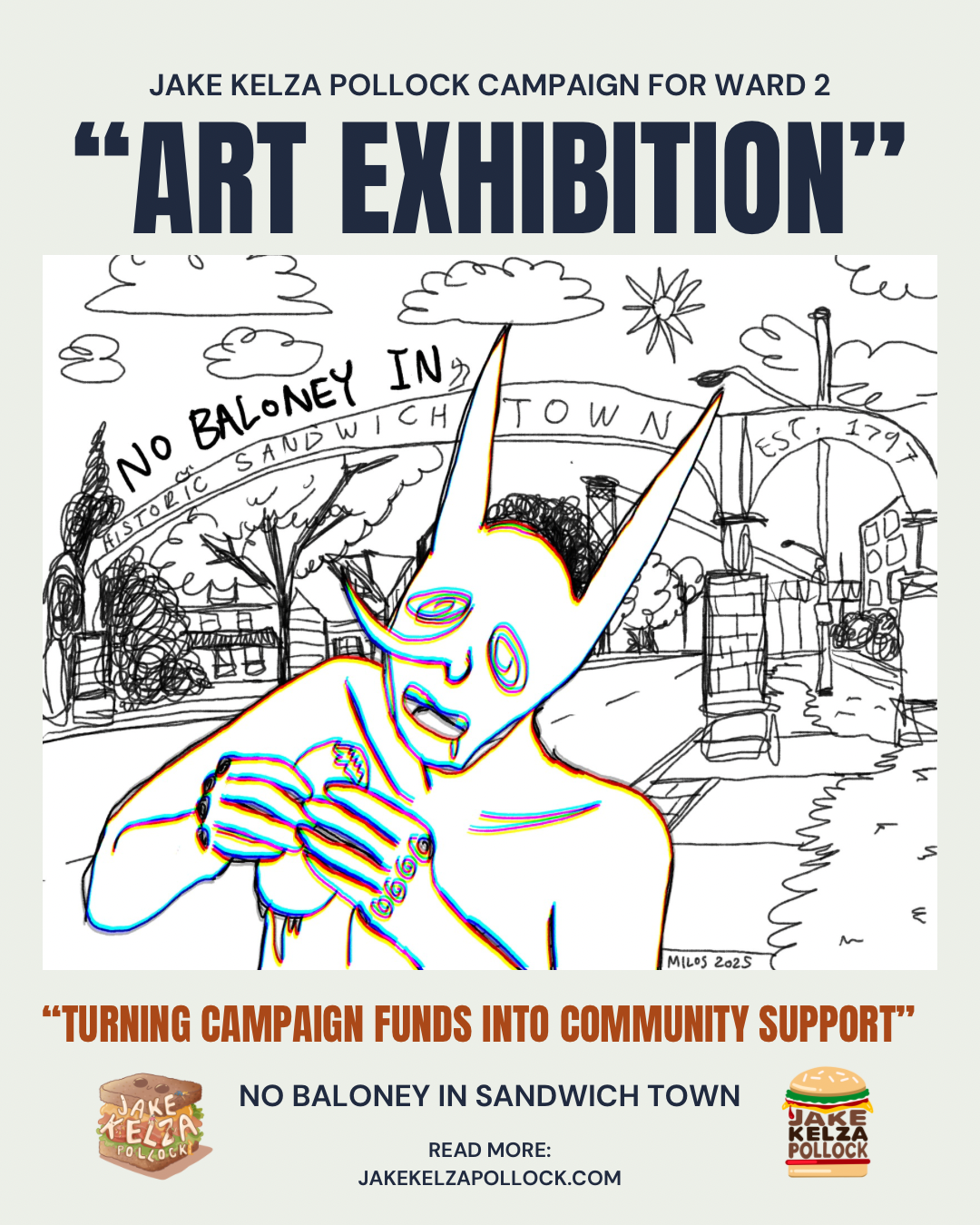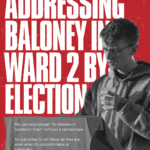My campaign slogan “No Baloney in Sandwich Town” isn’t just a catchphrase. It’s a promise to call things as they are, even when it’s uncomfortable or unpopular.
In recent days, I’ve been criticized for questioning potential or perceived conflicts of interest surrounding Frazier’s continued work as a policy consultant in a council role. I wasn’t going to address this further but I’ve been grilled for this line of questioning. I can’t fully explain my concerns without disclosing that they stem from firsthand experience with his campaign.
In early June, I was contacted by a local organization whose mission is to hold City Council and political candidates accountable. They had followed my work in the community and invited me to consider joining their board of directors, believing I could bring creative insight and value to their efforts. Although I mentioned that I was still recovering from health issues and might not be able to fully commit, I agreed to meet and discuss what my involvement might look like.
On June 30th, I met with two board members to talk about the role and the organization’s goals. What began as a normal interview quickly evolved into a deep, highly specific discussion about the potential of an upcoming Ward 2 by-election. I mentioned that if it was called, I would consider running and we agreed that if that happened, I would not get involved with the organization as it was a conflict. The conversation evolved to who might run, what each potential candidate’s strengths and weaknesses were and how I would approach a potential campaign if I decided to enter.
The discussion became extremely detailed and tactical. I was prompted on questions about potential candidates, mainly Frazier in hindsight, regarding their reputations, public images and what areas they might perform well or poorly in. Believing this conversation would benefit the organization’s accountability framework, I spoke candidly and in depth, not just about the other candidates but also about my own strengths and weaknesses. Over the course of the conversation, I shared key elements of my campaign strategy, including my messaging and engagement plan centered on authenticity, humor and transparency using memes and social media to connect with younger voters. I highlighted my physical limitations due to concussion recovery and how it would shape my campaign style away from door knocking, discussed my talking points and priorities down to debate strategy, how I planned to leverage my grassroots experience against candidates with more relevant professional backgrounds and expressing my opinion that some candidates could come across as overly polished or impersonal and shared my belief that I would be able to bulldoze through that type of candidate with relatability if I could target youth votes effectively.
In hindsight, this meeting was essentially a full disclosure of my campaign playbook and personal weaknesses, shared in good faith with an organization advocating for candidate and council accountability and transparency.
Weeks later, during an unrelated lunch with a friend who knows nothing about politics, we got into my potential run for council. I brought up the suspected candidates and my friend was very excited to tell me that she knew Frazier’s girlfriend. This is how I learned that Rachael, who had conducted the meeting and was part of the board preparing to evaluate candidates, was in a romantic relationship with Frazier, the very candidate I had completely dissected in the meeting weeks prior. Concerned about the implications with the organization’s mission, I contacted the other board member present at the meeting and asked whether this relationship had been disclosed, given that Rachael was contributing to the metrics used to assess and rank candidates. He was completely unaware of this, but agreed that it posed a serious ethical problem. Shortly after raising these concerns to the board, Rachael and also Jess (Frazier’s campaign social media person) were both placed on leave from their respective roles within this organization. I declined the offer to join their board of directors for obvious reasons.
When Frazier formally announced his campaign during a local radio appearance, I was advised by someone aware of the June 30th meeting to listen closely to it, as many of his launch talking points closely resembled the exact discussion I had with Rachael weeks earlier. While I can’t claim with certainty that my private comments directly influenced his campaign narrative, it’s difficult to overlook the similarities, particularly his sudden emphasis on casual social media content, lighthearted stunts and youth targeted messaging, while completely avoiding talking about any substantial policy for the vast majority of his campaign – the very thing that is his selling point in this election. Instead, he opted to jump in bouncy castles and recreate Instagram trends with no actual substance to seem…relatable? These strategies all mirrored the approach and responses I had outlined in detail to Rachael during this board interview.
Even if this is all purely coincidental, this situation highlights why transparency matters so much in politics.
When a candidate’s romantic partner is involved with an organization that claims to advocate for transparency and holding candidates accountable while not disclosing this and seemingly prying into other candidate campaigns, the integrity of the campaign should be called into question.
I’ve been assured by the organization involved that they are taking this issue extremely seriously. They’ve evaluated the influence Rachael and Jess may have had on the ranking metrics and have already taken steps to review and address the situation further. I believe in the organization’s mission, respect the people involved and I genuinely look forward to seeing how they navigate this hurdle and become a positive, trusted force in promoting transparency and accountability within our community and local politics.
Voters deserve to understand the dynamics at play during my questioning of his potential conflicts and since I believe in holding everyone to the same standard, I don’t blame anyone for questioning my approach either.
My campaign slogan “No Baloney in Sandwich Town” isn’t just a catchphrase. It’s a promise to call things as they are, even when it’s uncomfortable or unpopular.
Regardless of winning, I will continue to advocate for transparency and accountability on council because those values matter more to me than optics.
So when Frazier says people can “see through my bologna” I’d like to remind him that the baloney is sitting at his own kitchen table.
As of Oct. 26 the organization has made clear to me that Rachael and Jess had no influence on the current form of the survey that was sent out to candidates and have removed themselves from further discussions about advocacy priorities.





